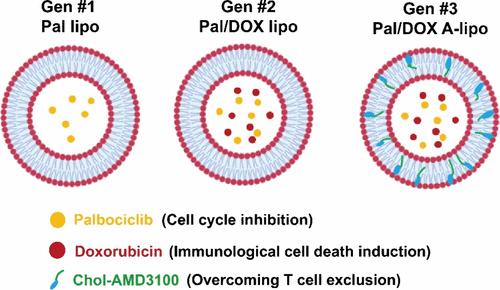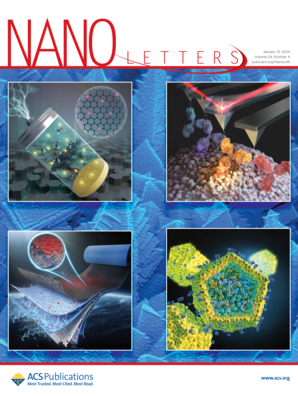Iterative Design of a Prodrug Nanocarrier for Cell Cycle Arrest, Immune Modulation, and Enhanced T Cell Infiltration for Colon Cancer Therapy
IF 9.6
1区 材料科学
Q1 CHEMISTRY, MULTIDISCIPLINARY
引用次数: 0
Abstract
Recent advancements in cancer therapy have highlighted the dual role of cyclin-dependent kinase 4/6 inhibitors (CDK4/6i) in both cell cycle regulation and immune activation. However, applying CDK4/6i to immunologically unfavorable tumors is challenging due to the complex tumor microenvironment (TME), characterized by inadequate T cell recruitment and exclusion mechanisms that hinder an effective antitumor immunity. In this work, we iteratively designed prodrug liposomal nanocarriers that integrate multiple functions: cell cycle inhibition through encapsulation of CDK4/6i, immune activation via concurrent delivery of an oral gavage-inducing chemotherapy agent, and overcoming T cell exclusion through the incorporation of a cholesterol prodrug. This iterative nanocarrier design effectively improves the pharmacokinetic profile of CDK4/6i, overcomes the immunosuppressive TME, achieves superior antitumor efficacy, and synergizes with immune checkpoint inhibitors to provide lasting effects in various colon cancer animal models.

求助全文
约1分钟内获得全文
求助全文
来源期刊

Nano Letters
工程技术-材料科学:综合
CiteScore
16.80
自引率
2.80%
发文量
1182
审稿时长
1.4 months
期刊介绍:
Nano Letters serves as a dynamic platform for promptly disseminating original results in fundamental, applied, and emerging research across all facets of nanoscience and nanotechnology. A pivotal criterion for inclusion within Nano Letters is the convergence of at least two different areas or disciplines, ensuring a rich interdisciplinary scope. The journal is dedicated to fostering exploration in diverse areas, including:
- Experimental and theoretical findings on physical, chemical, and biological phenomena at the nanoscale
- Synthesis, characterization, and processing of organic, inorganic, polymer, and hybrid nanomaterials through physical, chemical, and biological methodologies
- Modeling and simulation of synthetic, assembly, and interaction processes
- Realization of integrated nanostructures and nano-engineered devices exhibiting advanced performance
- Applications of nanoscale materials in living and environmental systems
Nano Letters is committed to advancing and showcasing groundbreaking research that intersects various domains, fostering innovation and collaboration in the ever-evolving field of nanoscience and nanotechnology.
 求助内容:
求助内容: 应助结果提醒方式:
应助结果提醒方式:


